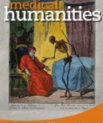Micah Allen From IMC Wants to Change Academic Publishing
It's time to abandon the ways of old. Forget peer-reviewed articles in commercial scientific journals, says Micah Allen. The IMC researcher has launched a new campaign for academic self-publishing on the web. And his message seems to strike a chord with scholars far and wide.

Birth of a New School
"Would you say the current system for academic publishing is broken?", I ask Micah outright, as he graciously agrees to sit down for an interview at a couple hour's notice. The American neuroscientist squirms a little at the bluntness of my question. "Well ... I try to be a little more diplomatic than that", he replies with a wry smile. Diplomatic or not, there is an unmistakable scent of revolutionary manifesto to the elaborate article he published on his personal blog Neuroconscience.com this weekend. "Birth of a New School: How Self-Publishing can Improve Research", reads the full title of Micah's blog post. The gist of it is this: Academic publishing as we know it, is riddled with problems that are not only frustrating to the aspiring authors, but it is indeed a hindrance to the overarching goal of academic publishing itself; the proliferation of new ideas and quality research. Micah Allen is arguing the case for a new School in academic publishing. One in which the researchers themselves assume the role of the publisher. When you're publicly calling out for the establishment of a new School in academic publishing you're almost guaranteed to raise a few eyebrows. And Micah's blog post did indeed get a lot of attention in its first 48 hours on the web. Well over 2000 people had read, commented, linked and re-tweetet the article by Monday morning. I sat down with Micah in a relatively undisturbed IMC office to get a little colour and perspective on his attention grabbing blog post. I asked him to explain a little about the background for his self-publishing initiative. This is what he had to say.
We Don't Need the Publishers
"When I first started my PhD in Denmark (having just moved from the US), I struggled a lot with feeling isolated in my work. My solution was to start blogging about my research. At first I was just doing it for fun, and to improve my writing, reviewing a new study each week on my blog. I didn't think anyone was reading but suddenly the authors of those papers started leaving comments. Since then we've see quite a few scholars take to blogs to lend some much needed reality to over-hyped or poorly done studies. But self-publishing has been around in academia for a while now. Arxiv, an online pre-print archiving service, was launched back in 1991 and has revolutionized the way scholars in mathematics and physics communicate research. Ever since the beginning of the internet scholars have exchanged ideas on Usenet, email, and similar services. What we are seeing now is the more mainstream realization that we do not need big for-profit publishers to produce quality research - in fact they seem to be holding us back more than anything."

Overwhelming Response
The response to the blog post has been "really, really positive", says Micah enthusiastically. "So far the post has gotten several thousand views in just a few days, generated a ton of comments, and an outpouring of support. The scary thing was to try suggest that this sacred cow of academia - publisher based peer review - maybe wasn't the best thing for research value. At the same time, I had to try and respect the great work that is already being done by researchers in the meta-sciences, which has really become it's own field with an advanced set of findings. I was almost hesitant to publish the article as I though I might get a lot of hate from both sides. The fact that the post has done so well and generated so much positivity makes me think we are really seeing just the beginning of a massive cultural shift."
Next Step: PDF Manuscripts
"So, what's going to happen now?", I ask Micah, "the blog post has been very well received. What's the next step?". Of course he has thought about that too. "In the immediate future, we're putting together some easy to use templates that anyone can use to publish their own research commentaries or peer reviews, and have them quickly indexed by Google Scholar along with citation alerts", explains Micah. "We're also going to be publishing the post as a PDF formatted in the style of a well-known "high impact journal" to show that it is in fact pretty easy to create nice looking manuscripts. The goal here is just to get researchers to start publishing the work they are already doing and not getting credit for in the easiest way possible. Eventually I hope to publish data and other scholarly materials in the same way, to show that i'm willing to do my part. For now I think the key is really in setting some community standards for self-publishing post-publication peer reviews. After that we can start putting some of the infrastructure in place to see this work on a larger scale."

Publish-or-Perish
I ask Micah to offer some final thoughts on the impact he hopes to achieve with his blog post. The closing argument in Micah Vs. Traditional Publishing, had this been a court case. "We need a shift in culture", states Micah. "In the debate over publishing reform you hear a lot about novel infrastructures or tools, such as open-access movements and post-publication peer review platforms, but not enough about how we actually approach scholarly research. I think the situation we are in now, with the replication crisis, with findings suggesting massive quality control failures, long wait times, and obscure review processes is a product of our publish-or-perish culture. I don't mean to say that new tools Arxiv and Pubpeer are not an essential part of the reform process. But if you look at the mainstream community, these things are still largely fringe. So I want to participate in building that culture bridge between the way things are now and where they seem to be going. We can't wait anymore for technological solutions, and indeed many are already engaged in meaningful research self-publication. The wild west everyone worries about is already here, so it's time to take the conversation to the next level."
Click here to listen to the audio interview with Micah Allen
And please voice your opinion in the comments section below. Self-publishing starts here!



